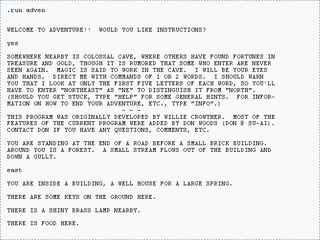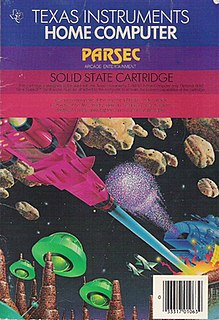| Look up parsec in Wiktionary, the free dictionary. |
A parsec is a unit of distance.
Contents
Parsec may also refer to:
| Look up parsec in Wiktionary, the free dictionary. |
A parsec is a unit of distance.
Parsec may also refer to:

Interactive fiction, often abbreviated IF, is software simulating environments in which players use text commands to control characters and influence the environment. Works in this form can be understood as literary narratives, either in the form of interactive narratives or interactive narrations. These works can also be understood as a form of video game, either in the form of an adventure game or role-playing game. In common usage, the term refers to text adventures, a type of adventure game where the entire interface can be "text-only", however, graphical text adventures still fall under the text adventure category if the main way to interact with the game is by typing text. Some users of the term distinguish between interactive fiction, known as "Puzzle-free", that focuses on narrative, and "text adventures" that focus on puzzles.
Program, programme, programmer, or programming may refer to:
Widget may refer to:
Developer may refer to:
The following outline is provided as an overview of and topical guide to software engineering:
A programming tool or software development tool is a computer program that software developers use to create, debug, maintain, or otherwise support other programs and applications. The term usually refers to relatively simple programs, that can be combined to accomplish a task, much as one might use multiple hands to fix a physical object. The most basic tools are a source code editor and a compiler or interpreter, which are used ubiquitously and continuously. Other tools are used more or less depending on the language, development methodology, and individual engineer, often used for a discrete task, like a debugger or profiler. Tools may be discrete programs, executed separately – often from the command line – or may be parts of a single large program, called an integrated development environment (IDE). In many cases, particularly for simpler use, simple ad hoc techniques are used instead of a tool, such as print debugging instead of using a debugger, manual timing instead of a profiler, or tracking bugs in a text file or spreadsheet instead of a bug tracking system.

Bureaucracy is an interactive fiction video game released by Infocom in 1987, scripted by comic science fiction author Douglas Adams. Infocom's twenty-fourth game, it is part of the Infocom Plus range which requires a machine with a minimum of 128K of memory.
Execution in computer and software engineering is the process by which a computer or virtual machine reads and acts on the instructions of a computer program. Each instruction of a program is a description of a particular action which must be carried out, in order for a specific problem to be solved. Execution involves repeatedly following a 'fetch–decode–execute' cycle for each instruction. As the executing machine follows the instructions, specific effects are produced in accordance with the semantics of those instructions.
An application program is a computer program designed to carry out a specific task other than one relating to the operation of the computer itself, typically to be used by end-users. Word processors, media players, and accounting software are examples. The collective noun refers to all applications collectively. The other principal classifications of software are system software, relating to the operation of the computer, and utility software ("utilities").
Tree diagram may refer to:

Parsec is a horizontally scrolling shooter written by Jim Dramis and Paul Urbanus for the Texas Instruments TI-99/4A and published by TI in 1982. Dramis also programmed Car Wars and Munch Man for the TI-99/4A.

The Saga of Erik the Viking is a text-based adventure video game developed by Level 9 Computing and published by Mosaic Publishing in 1984. The game runs on Amstrad CPC, BBC model B, Commodore 64, and Sinclair ZX Spectrum.

Thousand Parsec (TP) is a free and open source project with the goal of creating a framework for turn-based space empire building games.
This page is a comparison of notable remote desktop software available for various platforms.
In computer programming, a parser combinator is a higher-order function that accepts several parsers as input and returns a new parser as its output. In this context, a parser is a function accepting strings as input and returning some structure as output, typically a parse tree or a set of indices representing locations in the string where parsing stopped successfully. Parser combinators enable a recursive descent parsing strategy that facilitates modular piecewise construction and testing. This parsing technique is called combinatory parsing.
Parsec is a library for writing parsers in Haskell. It is based on higher-order parser combinators, so a complicated parser can be made out of many smaller ones. It has been reimplemented in many other languages, including Erlang, Elixir, OCaml, and F#, as well as imperative languages such as C#, and Java.

Steam Link is a hardware and software solution made by Valve Corporation for streaming Steam content from a personal computer or Steam Machine wirelessly to a mobile device or other monitor. Steam Link was originally released as a hardware device alongside the debut of Steam Machines in November 2015. Valve discontinued the Steam Link hardware device in November 2018, in favor of supporting its software-based Steam Link application for mobile devices and smart televisions, as well as providing Steam Link as a software package for the Raspberry Pi microcomputer.

Parsec is a proprietary desktop capturing application primarily used for playing games through video streaming. Using Parsec, a user can stream video game footage through an Internet connection, allowing one to run a game on one computer but play it remotely through another device. Although its main focus is gaming, Parsec can also be used as low-latency desktop sharing software. The Parsec client is available on most modern operating systems.